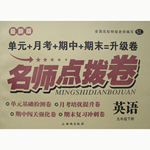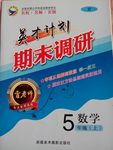题目内容
He has nothing to ________
- A.worry
- B.worry about
- C.worrying
- D.worrying about

 名师点拨卷系列答案
名师点拨卷系列答案 英才计划期末调研系列答案
英才计划期末调研系列答案Wang Hao and Wang Liqin, two of China’s top table tennis players, both saw the World Table Tennis Championships(世锦赛) as a chance to prove themselves. But there was only one trophy(奖杯) and Wang Hao, 25, won it last Tuesday in Yokohama(横滨), Japan.
Wang Hao, who won the men’s doubles title(对打) with Chen Qi last Monday, played with spirit to beat Wang Liqin.
Wang Hao said it was his mental toughness(心理韧性) that made the difference. “I was disappointed(失望) by my performances in past championships and the last two Olympic Games. But I have tried to pull myself together and prepared well. This is the result.”
Wang Hao said he has always understood the importance of physical training(体能训练) and technical skills(技巧). Now he knows the need for mental preparation as well. Having two Olympics silvers(银牌) had left him feeling bitter(辛苦的). The bitterness perhaps explains why he has not always played at his best in the past.
“I’ve come to understand that you can learn important lessons from failure,” he said. “Losing can build your character and make you a stronger player.” His next goal, or dream, is to win the gold medal at the London Olympics in 2012.
Liu Guoliang, head coach of China’s table tennis team, sang the praises of Wang Hao’s victory. “This is just the beginning of his rise,” said Liu. “it’s the confidence-booster(信心) he needs to make further progress.”
【小题1】 Who won the trophy of the World Table Tennis Championships?
| A.Wang Liqin. | B.Wang Hao. |
| C.Both of them. | D.Neither of them. |
| A.He won the last two Olympic Games and the past championships. |
| B.He won the past championships but lost the last two Olympic Games. |
| C.He won the last two Olympic Games but lost the past championships. |
| D.He lost the last two Olympic Games and the past championships. |
| A.his mental toughness | B.his technical skills |
| C.his physical training | D.his good luck |
| A.take more physical training | B.improve his technical skills |
| C.keep the bitter feeling | D.be a confident man |
You have often __1__ people talk about work. Perhaps you have __2__ your friends about how hard you worked to get something done. However, you may have done no work __3_ you think you worked hard.
A boy is pushing a big box very hard, but the box is __4__ heavy for him to move and he may __5__ to push against the box. __6__ the language of science, he has not done __7__ work. Can you think you are working when you are studying or talking?
In science, work is only done when a force(力) moves something that has weight through a distance(距离).
Work =" force" × distance moved.
__8_ you want to find out whether work is done, _9_ yourself, “Is a push or a pull moving something through a distance?” If your answer is __10_, then work is being done.
| 【小题1】 |
|
| 【小题2】 |
|
| 【小题3】 |
|
| 【小题4】 |
|
| 【小题5】 |
|
| 【小题6】 |
|
| 【小题7】 |
|
| 【小题8】 |
|
| 【小题9】 |
|
| 【小题10】 |
|
Jim Green has been in China for more than two years. He has been to many interesting 31 in Beijing, but he has not yet been to many other parts of 32 . Last week he went to Mount Emei in Sichuan with his 33 .
Many people like to travel by 34 , but the Greens think that travelling by train is the best. It is much 35 and far more enjoyable than a rushed journey by air. They had a wonderful train ride to Chengdu 36 they went on to Mount Emei by bus.
The train was quite nice and tidy, and there weren’t too many people in 37 sleeping car. The Greens could stand up and 38 around. It was a long journey, 39 none of them felt tired. They kept 40 the beautiful things out of the window. They talked, laughed and played cards. The conductor kept coming to give them hot water and 41 them newspapers. People nearby 42 with each other. A young man tried to speak English with Mr and Mrs Green. Jim thought the train was like a big moving party. He went to sleep quite 43 . He enjoyed listening to the sound of the running train and then fell asleep.
When Jim woke up the next morning, the train was already 44 Chengdu. His train ride seemed really 45 , but his memory (记忆) of the pleasant journey will last long.
| 【小题1】 |
|
| 【小题2】 |
|
| 【小题3】 |
|
| 【小题4】 |
|
| 【小题5】 |
|
| 【小题6】 |
|
| 【小题7】 |
|
| 【小题8】 |
|
| 【小题9】 |
|
| 【小题10】 |
|
| 【小题11】 |
|
| 【小题12】 |
|
| 【小题13】 |
|
| 【小题14】 |
|
| 【小题15】 |
|
First Frenchman: I once heard someone shout, “Look out,” I put my head out of a window and a basin (盆) of water fell on me. It seems that “Look out” may mean “don’t look out.”
Second Frenchman: Once I was on a ship and heard the captain (船长) shout, “All hands on deck,” I put my hands on the deck and someone walked on them.
Third Frenchman: I once visited an English friend early in the morning and the maid who came to the door and said, “He’s not up yet. Come back in half an hour,” When I went again for him, she said, “He’s not down yet.”
“If he’s not up and he’s not down, where is he?” I asked.
She said, “He’s still in bed. When I say ‘He’s not up ’ I mean ‘he has not yet got up’. When I say‘He’s not down ’I mean ‘he has not yet come downstairs.”
【小题1】“Look out”here means “ _______”.
| A.put your head out of the window and look |
| B.Take care |
| C.I’m going to pour the water |
| D.Help me |
| A.All the sailors gather ( 集合 )on deck |
| B.Give your hands to me |
| C.Put your right hand and left hand on deck |
| D.Shake your hands with me |
| A.was washing his face |
| B.was having his breakfast |
| C.was still in an upstairs room |
| D.was reading a newspaper |